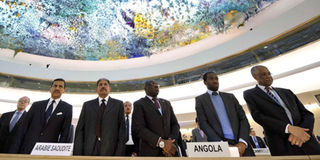Why Kenya voted against Libya

Delegates stand up for a minute of silence on the opening day of the 16th session of the United Nations Human Rights Council focusing on deadly repression in Libya on February 28, 2011 in Geneva. Clinton said that backing political transitions in the Arab world was not just a matter of ideals, but a "strategic imperative". AFP PHOTO / FABRICE COFFRINI
Kenya failed to stand by its ally Libya whose support the government sought in the bid to defer ICC cases.
The country joined the rest of the world to vote for Tripoli’s suspension from the United Nations Human Rights Council. (Read: UN Council hits Gaddafi with sanctions over crackdown)
But the government’s voting at the UN General Assembly was defended by the Foreign affairs ministry in Nairobi.
Acting Foreign Affairs permanent secretary Patrick Wamoto said Kenya’s action should not be viewed as hostile.
“This is a matter that even the African Union has spoken out against because the response against the Libyan people was well beyond what was expected,” said Mr Wamoto.
“Almost every other country has expressed dismay.”
The suspension was due to Libyan leader Muammar Gadaffi’s lethal crackdown on protests as the Security Council warned of new action against his regime. (Read: Gaddafi forces open fire on Tripoli protesters)
The 192-member assembly passed a suspension resolution without a vote, after UN chief Ban Ki-moon urged the body to “act decisively.”
No country spoke up for the Libyan regime at the brief debate.
Col Gadaffi was one of the African leaders Vice President Kalonzo Musyoka met as he lobbied the continent’s leaders to support Kenya’s request to have the ICC cases deferred. (Read: Gaddafi backs Kenya's quest for ICC deferral)
Mr Musyoka’s meeting with Col Gadaffi, who unsurprisingly gave his blessings to Kenya’s request, has come under criticism from several quarters.
Last week, Deputy PM Musalia Mudavadi told a rally in Kakamega that Mr Musyoka owed the country an apology for seeking support of the embattled Libyan leader in the bid to have the cases deferred.
“Look at the people my friend Kalonzo is associating us with,” he said.




